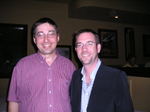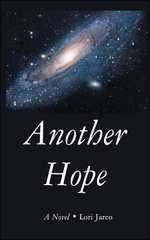UPDATE 4-22-2006: James Kosub appears to have come to his senses and deleted the ridiculous accusations against me that he posted on his blog, so I’ve deleted the post that formerly occupied this space (the comments, however, remain).
My Blog
Schmoozing in the Desert
 Tonight I went to the author’s reception for the Palm Springs
Tonight I went to the author’s reception for the Palm Springs Book Festival, where I will be appearing in front of all my adoring fans (my Mom, a vagrant, my brother Tod). I had a great time catching up with old friends like Carleton Eastlake, Loraine Despres, Christopher Rice, and Gregg Hurwitz (and his lovely wife). And I made some new friends, like Eric Shaw Quinn and retired SEALS Charles O’Connor and Ross Hengebrauch. My daughter Maddie absolutely loves QUEER EYE FOR THE STRAIGHT GUY, so when I spotted Ted Allen, I had to have my picture taken with him. Maddie was blown away. Meanwhile my Mom, Jan Curran, got up close and personal with Tab Hunter. And I’ve got the photos to prove it.
Book Festival, where I will be appearing in front of all my adoring fans (my Mom, a vagrant, my brother Tod). I had a great time catching up with old friends like Carleton Eastlake, Loraine Despres, Christopher Rice, and Gregg Hurwitz (and his lovely wife). And I made some new friends, like Eric Shaw Quinn and retired SEALS Charles O’Connor and Ross Hengebrauch. My daughter Maddie absolutely loves QUEER EYE FOR THE STRAIGHT GUY, so when I spotted Ted Allen, I had to have my picture taken with him. Maddie was blown away. Meanwhile my Mom, Jan Curran, got up close and personal with Tab Hunter. And I’ve got the photos to prove it.  (First photo is me with Ted Allen, the second photo is my Mom with Tab Hunter, and the third photo is me with Gregg Hurwitz, Eric Shaw Quinn, and Christopher Rice).
(First photo is me with Ted Allen, the second photo is my Mom with Tab Hunter, and the third photo is me with Gregg Hurwitz, Eric Shaw Quinn, and Christopher Rice).
The Enterprise has a new Captain
Variety reports that JJ Abrams has been signed to write, produce and direct the 11th STAR TREK movie, along with his LOST team of Damon Lindelof and Bryan Burk. Abrams will co-write the movie, which follows the Starfleet Academy years of Kirk and Spock, with his ALIAS and MISSION IMPOSSIBLE III scribes Alex Kurtzman and Roberto Orci.
Goodbye to Gilmore Girls
Word has hit the trades that GILMORE GIRLS writer/creator/showrunner Amy Sherman-Palladino and her husband Dan are leaving the show.
"Despite our best efforts to return and ensure the future of Gilmore Girls
for years to come, we were unable to reach an agreement with the studio
and are therefore leaving when our contracts expire at the end of this
season," said Amy and Dan in a statement. "Our heartfelt thanks go out
to our amazing cast, hard-working crew and loyal fans. We know that the
story lines from this season will continue into the next, and that the
integrity of the show will remain long after we leave Stars Hollow."According to a statement released by Warner Bros., "While we are
disappointed that Amy Sherman-Palladino and Dan Palladino have decided
not to stay with the show next season, we are very confident that Dave
Rosenthal, an experienced writer/producer with the show, will make the
transition seamless moving into the seventh year of Gilmore Girls.
We want to thank Amy for creating and nurturing this wonderful series
for the past six years and giving us one of the most memorable
mother/daughter relationships in television history."
No HOPE for this Fanficcer

Lori Jareo, a self-published author, is selling her fanfic STAR WARS novel ANOTHER HOPE as a print-on-demand title on the Amazon and Barnes & Noble websites. Apparently, neither Amazon nor Barnes & Noble looked at the book before they listed it for sale. Jareo talks about the obvious copyright violation issues in a Q&A on her website:
Q: Having set Another Hope in an already existing universe, I find myself wondering if there was any concern on your part regarding copyrights?
No, because I wrote this book for myself. This is a self-published story and is not a commercial book. Yes, it is for sale on Amazon, but only my family, friends and acquaintances know it’s there.
Q: I also wonder how far a writer is allowed to write in a world and to use characters introduced by another author?
If it’s not a commercial project, I don’t see any problem.
It’s not a commerical project…but she’s selling it on Amazon and Barnes & Noble (and offering it for sale on her website). What a moron. She even had the chutzpah to copyright her novel. She offered this disclaimer on the book:
The characters in this book are trademarks of Lucasfilm Ltd. The publisher of this book is not affiliated with Lucasfilm.
As if those two sentences would make it okay to publish and sell a STAR WARS novel without permission from Lucasfilm, the rights-holder. The stupidity of the author and her publisher (which is herself) is mind-boggling.
I’m told by sources in-the-know that LucasFilm and Ingram, one of the nation’s largest book distributors (and the folks who supply B&N and Amazon) are now aware of the infringement and aren’t happy about it. I don’t think you’ll see this fanfic listed on Amazon or Barnes & Noble for much longer. And in the wake of this embarrassing episode, I believe the major online booksellers will be seriously rethinking their system for listing P.O.D. titles…
Now, if you will excuse me, I have to get to work on my self-published sequel to THE DAVINCI CODE. I don’t think Dan Brown or Simon & Schuster will mind.
UPDATE 4-21-06: Lori’s ANOTHER HOPE site has been shut down. That was fast. Lucasfulm must have hit her like a nuclear bomb.
UPDATE 4-22-06: How many different ways can you call someone stupid? Check out what the blogs are saying about Lori Jareo. 
Here’s a sampling of some of the blog headlines: "The Stupid Is Strong With This One," "Behold: The Greatest Story of Stupidity Ever Told," "I Bet She Finds Our Lack of Faith Disturbing," "Feel The Stupid," "The World’s Stupidest Human," "Soooo Amazingly Stupid," "Good Lord, How Stupid Can A Person Be?" and "Face Palm, Head Desk, and a Generous Smattering of WTF?" GalleyCat reports that she even listed her fanfic STAR WARS novel in her bio for a poetry conference!
In this case, the fanfic community and I are in total agreement.
UPDATE 4-26-06: ANOTHER HOPE is no longer listed on Amazon. It’s still listed on Barnes & Noble, but with the note: "A new copy is not available from Barnes & Noble.com at this time." I have to wonder how anyone at B&N could have read the material submitted for the ANOTHER WORLD listing and not realized that it infringed on Lucasfilm’s trademarks and copyrights. Here’s the B&N listing:
The MARCH Goes On
There’s a fascinating debate happening over at Jeff Mariotte’s blog regarding the Pulitzer prize winning novel MARCH by Geraldine Brooks. Is it a tie-in? Is it fanfic? Is it a literary homage? Or is it an entirely original work? Be sure to check out the lively comments to his post.
Gischler is the Victor

The Crime Fiction Dossier has given a rave to my friend Victor Gischler‘s new book.
"Gischler’s best book since Gun Monkeys
is a sinfully-delicious orgy of violence, thrills and dark humor.
Nobody does comic noir like this guy. Nobody." -Crime Fiction Dossier
I’m looking forward to reading it. And if you haven’t read GUN MONKEYS yet, you are really missing out.
Good News For TV Writers
The California State Supreme Court threw out a lawsuit by a writer’s assistant against the writers and producers of FRIENDS. The assistant charged that the sexually explicit jokes and anecdotes shared among the writers in the writer’s room created a "hostile work environment." (You can read the full text of the decision here)
Because "Friends" was an "adult-oriented comedy show featuring sexual
themes," Lyle should have expected coarse language from writers producing jokes
and scripts for the show, the Supreme Court held in its ruling.While the Fair Employment and Housing Act prohibits conduct that creates a
hostile or abusive workplace for women, it does not outlaw "sexually coarse and
vulgar language that merely offends," the high court said.The case raised questions of how far TV comedy writers can go in pushing the
boundaries of taste in their private joke-writing sessions, with supporters of
the writers and producers arguing that Lyle’s suit infringed on their freedom of
speech.The high court declined to address the free-speech issues raised in the
case."We have no occasion to determine whether liability for such language might
infringe on free speech rights," the court held.The show’s writers claimed Lyle was fired because she was a slow typist who
often missed the jokes she was supposed to transcribe.
I See a Lawsuit Coming
Novelist Millenia Black , who is African-American, claims she has been told by her editor to change the race of the characters in her latest book, THE GREAT BETRAYAL, from white to African-American or they won’t publish it. She writes on her blog:
THE GREAT BETRAYAL is a story about secrets. Secrets.
And just how long you can bury them before the past crashes into the
present, with a vengeance. Pretty universal subject matter, yes? I
thought so. Now, suppose you’d written such a novel, and your
publisher told you that, although it was a dynamite story, they would
not accept it—because the characters were white. The race must be
changed before they’ll publish it!
If this story is true, I don’t blame Millenia for being outraged. She believes that she’s being told that as an African-American author she can’t write about whites. They are, in essense, relegating her to a niche market — strictly "African-American" readers. Black adds in a comment to her post:
It’s one thing to write to an AA audience. It’s another thing to write mainstream/commercial fiction and be relegated
to an AA audience. The fact that you can’t write a book with
main characters that happen to be white (would have to lie about or
hide your race in order to do so) is the Jim Crow of modern-day
publishing. Enough is enough.
Especially when you consider that nobody has a problem with James Patterson, a middle-aged white guy, writing about a black detective. But a black woman can’t write about white characters? It’s ridiculous.
UPDATE: Bloggers Monica Jackson, MJ Rose and Edward Champion weigh in..
UPDATE 10-9-06: She’s suing. Millenia writes:
Career or no career, the genre of a book should not be determined by
its author’s color. An author should not have to lie about his or her
skin color in order to obtain equitable handling by a publisher. An
author’s skin color should not determine where his or her books will
likely be shelved by a bookseller, or whether or not some booksellers
will even order said book. The color of an author should be of no
interest in any acquisition. If they want a book about black people, that’s what should be acquired – a book about black people.
Telling Lies

Christina York’s latest ALIAS tie-in novel, STRATEGIC RESERVE, just came out and she muses today about the craft of tie-in writing:
Another thing about writing tie-ins. It takes a lot
of research. You have to get it all right.[…] But it’s not just the stuff from the
show. It’s all the rest of the world, too. Alias was particularly
challenging, because of the diverse and exotic locations.In STRATEGIC RESERVE, a good portion of the book was set above the
Arctic Circle, along the Trans-Alaska Pipeline. I have never been about
the Arctic Circle, but I know if I messed anything up, I will hear
about it from a reader or three. So I spent a lot of time looking at
photos on line, studying maps, and reading accounts of people who have
been there.[…] Writers tell lies for a living. But we try to layer in enough truth
that you believe everything we tell you.



